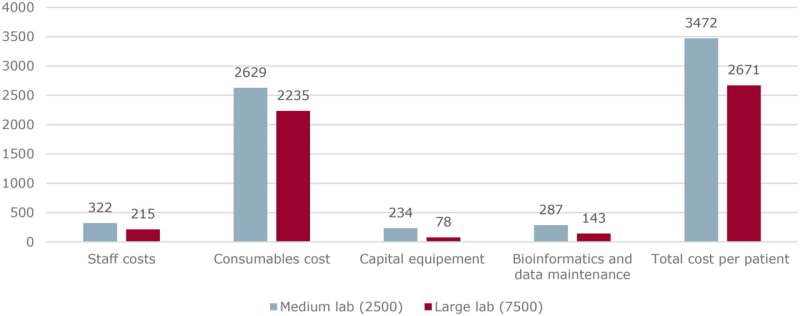This article has been reviewed according to Science X's editorial process and policies. Editors have highlighted the following attributes while ensuring the content's credibility:
fact-checked
trusted source
proofread
Cost of whole-genome sequencing approaching current routine genetic testing in blood cancer

The cost of whole-genome sequencing is approaching that of the traditional genetic tests currently used for patients diagnosed with acute leukemia, according to a new study published in the Journal of Medical Economics.
With costs falling and whole-genome sequencing adding new information that can improve treatment decisions, researchers see a future in which whole-genome sequencing becomes the standard for acute leukemias.
Whole-genome sequencing is becoming increasingly common in health care to improve the diagnosis and thus treatment of cancer. While today's standard diagnostic tests for acute leukemias use a range of different genetic tests, research has shown that whole-genome sequencing as a single method can potentially replace current tests.
In addition, it can provide new and important information in a significant proportion of cases, which can improve both risk assessment and treatment decisions.
Costs of whole-genome sequencing approaching current routine analysis
The study was carried out by Genomic Medicine Sweden (GMS) and the Clinical Genomics platform at SciLifeLab. Results from the study show that whole-genome sequencing is still more expensive than routine analysis for acute leukemias.
"However, I believe that within a year or so, whole-genome sequencing will be down to similar costs as the methods we routinely do in health care now for acute leukemias," says Richard Rosenquist Brandell, senior author, Senior Physician and Professor of Clinical Genetics at the Department of Molecular Medicine and Surgery, Karolinska Institutet.
A key conclusion from the study is that reagent costs for whole-genome sequencing are by far the most costly item, from sample collection to response to the treating physician.
"Calculations we performed in this study clearly show that by utilizing the capacity of the new sequencing instruments, and that reagent costs are likely to decrease by 50%, the cost of whole-genome sequencing approaches that of today's routine analyses," says Brandell.
'It is not easy to derive costs for current routine analyses'
The study compares, in a Swedish context, what a whole-genome sequencing and today's genetic routine analyses cost from sample to answer for acute leukemias, so-called "micro-costing." Costing data from both children and adults with acute lymphoblastic leukemia (ALL) and acute myeloid leukemia (AML) from four university hospital laboratories in Stockholm, Lund, Gothenburg and Uppsala were collected.
"It is not easy to derive costs for today's routine analyses," says Tharshini Thangavelu, first author and health economist at Linköping University.
"It has taken a lot of work for each university hospital to collect the cost data, but also for us to create a detailed understanding of each cost component and how to correctly interpret it. Thus, uniformly collecting the cost data is a pre-condition to be able to compare the costs across the laboratories," Thangavelu continues.
Work remains to replace current methods
A transition from using the many methods used today to one technology means that you get a more standardized laboratory process.
"The ongoing collaboration within Genomic Medicine Sweden where whole-genome sequencing is being validated as a diagnostic tool for acute leukemia means that the method will be introduced into clinical routine at approximately the same time across the country.
"Being able to detect all important genetic variants with one and the same method will also simplify a comprehensive reporting of the findings and their significance to the treating physician," says Anna Staffas, Clinical Laboratory Geneticist at Clinical Genetics and Genomics, Sahlgrenska University Hospital.
"The challenge right now for the laboratories around the country that perform genetic diagnostics is to enable a sufficiently fast whole-genome analysis so that today's common techniques can be replaced in practice," continues Staffas.
For whole-genome sequencing to replace current methods, the time from sample collection to response must be reduced to two weeks for children and three weeks for adults with acute leukemia.
"I think we will be there within the next year, especially since we have now introduced whole-genome sequencing routinely for children with leukemia.
"And we see in other ongoing studies we are performing that whole-genome sequencing finds everything clinically relevant that we need to identify with routine methods and adds important information—information that allows us to say even more accurately which risk group the patient belongs to, which is important for prognosis and treatment.
"Whole-genome sequencing also provides data that we can explore to find new clinically relevant genetic abnormalities," says Valtteri Wirta, Head of Unit and Platform Scientific Director, SciLifeLab Clinical Genomics Stockholm.
From micro-costing to health economics
"Micro-costing is a good start which allows us to compare the average cost of one method with an alternative method. However, I would like to see more health economic analyses to include patient benefits—what are the benefits to the individual when the health care system introduces a new method, i.e., how well is our tax money used," says Thangavelu. "Here I think Genomic Medicine Sweden is an important actor to push for more health economic studies."
Not only are leukemias moving from current routine methods to whole-genome sequencing, but it has also begun to happen for children with cancer and adults with sarcomas and other rare cancers.
"More comprehensive health economics studies will be crucial to making important decisions and priorities in health care in the future," concludes Brandell.
More information: Tharshini Thangavelu et al, Micro-costing of genetic diagnostics in acute leukemia in Sweden: from standard-of-care to whole-genome sequencing, Journal of Medical Economics (2024). DOI: 10.1080/13696998.2024.2387515




















